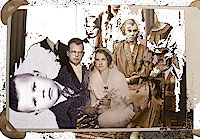The Man from India
 Most young people in the Baltic States are looking into the future, and sick of dwelling on stories from the past. For some, visiting grandparents means hearing their depressing memories about war, or having to listen to them talk about all of their friends who are now dead. A free Sunday afternoon is much more pleasant if spent on the beach, drinking beer with friends. Yet, inside the stories of this dying generation who lived through World War I and World War II, are lessons relevant to young people today. Is Latvia, the small country that has been cast as a victim in the history books, really so holy and guilt free?
Most young people in the Baltic States are looking into the future, and sick of dwelling on stories from the past. For some, visiting grandparents means hearing their depressing memories about war, or having to listen to them talk about all of their friends who are now dead. A free Sunday afternoon is much more pleasant if spent on the beach, drinking beer with friends. Yet, inside the stories of this dying generation who lived through World War I and World War II, are lessons relevant to young people today. Is Latvia, the small country that has been cast as a victim in the history books, really so holy and guilt free?
Every nation has faults and people within its borders who breed hate, and fail to look at their fellow neighbor with open eyes. Most of us are guilty of turning our heads when passing by an old woman quietly begging for money, or of feeling uncomfortable around a foreigner whose country, or skin color, is unlike our own. In 1944, at the age of 34, Alvine Zibnera left her native country of Latvia, along with her two year-old son and husband, for fear of her family's safety under Soviet occupation. This was the beginning of a life in exile; seven years living in Displaced People camps in Germany, and the remaining years building a life for herself and her family in America. She only returned to Latvia once in the 1980s, but lived to hear the stories of Latvia's independence from her television screen in Sacramento, California. After her death in 2003, a chest was found including old pictures of Latvia, and her diary which she started writing when her son was born in 1942. This is my grandmother, and these are her words.
February 27, 1945 Adolf Hitler Street Gotha, Germany
It is a heavy, foggy morning. An endless line of prisoners of war is moving along our street. The sidewalks are full of curious people. The windows of every house noisily burst open, there is a laugh on many faces and wonder in many eyes. Tired, not paying any attention to anything, there move Englishmen, Spaniards, Americans, Russians, Mongolians, Negroes, and Arabs. It seems that only the Frenchmen still are able to smile or even to make a remark or two to the people on the sidewalk. The local people are particularly interested in the Negroes who stiffly look forward and carry all their belongings and little pieces of wood on their heads.
Some frightened women are lamenting loudly about the possibility that these black, coalcolored people had dreamt of ruling Germany. Children joyfully jump up and down and laugh about such unseen buffoons. Suddenly, the long line stops. Many prisoners are completely exhausted and at once fall down on the muddy street. Some try to help them. Others try to bind their belongings stronger together. Still others look with interest to the garbage containers which have been placed along the street for collection. Helpful boys find in the containers the hard cores of cabbage-heads and give them to the prisoners. They eagerly chew them. After several hours the long line of prisoners has disappeared. The street is empty.
But no! Loud yells, shrieks and curses come from the street. Soon they are accompanied by the sound of heavy blows by a club or cudgel. Not far from our window a prisoner has fallen down into the gutter. In the dirt and mud is laying a son of Tagore's country, of India. Two soldiers are standing near him: an older officer and a soldier with rather bent legs. In their hands they hold heavy clubs with the lower ends bristly from a great deal of use. They kick the prisoner with their feet, hit him with their fists, and drag him through the mud. They cuss him all the time and soon both clubs are again at work on the back, shoulders and feet of the prisoner. The prisoner receives it all without resistance, submissively, meekly.
Like a corpse he is laying in the mud and dirt of the street. The officer, who probably is too tired from hitting prisoners, finally throws a rag over the head of the prisoner and walks away. Meanwhile, many curious people have gathered around the prisoner. The mob apparently has been well entertained and loudly expresses its approval to the soldier with bent legs. He appears to feel proud and in the role of a hero. The veins on his neck are swollen, he breathes heavily, his enraged eyes can be seen even through his glasses. The curses, blows and the laughter of the people form an unheard symphony. In the first row around the fallen prisoner stand little boys. Somehow they have managed to acquire sticks of wood, not much different from the one in the handle of the soldier, the hero. Everybody wants to find out how the insubordinate, stubborn prisoner looks. In order not to lose his victim, the soldier uses his almighty club to push the people a little away from the prisoner.
A neighborhood artist is bending out of his window and advising the soldier to shoot the spiteful, obstinate enemy. But the rest of the mob does not agree to end the spectacle as simply and quickly as suggested. The hand of a helpful woman hands the soldier a pitcher of water. The women and children form a tight ring around the prisoner and the soldier. What is going to happen now? The soldier is pouring the water over the head and the back of the prisoner. Then he continues to hit the prisoner while breathing heavily and cursing him with every blow. The mob accompanies the performance of the soldier with their laughs. But the Indian does not respond in any way, probably because of complete exhaustion.
Suddenly, a very tall man appears with a strange cap on his head. It is quite unbelievable but this man dares to interrupt the laughter of the mob. Even the blows stop. The strange man talks something about humanity and about helping those who cannot help themselves anymore. But soon the women, especially one with a large, aquiline nose, remind him in loud, crackly voices that this is no human but rather an animal, a foreigner, an enemy who refuses to obey orders. The women are supported by approving cries from the rest of the mob. Meanwhile, the soldier has regained some strength. But the blows do not continue any more – perhaps the words of the stranger have influenced him more than the croaking women.
Yes – and a little farther away something new and interesting has come up. Two new prisoners are standing on the edge of the sidewalk and a soldier accompanies them. The mob is running to this group and expects a new spectacle. But they are disappointed – the soldier is too honest and patient. He lets his tired prisoners rest for a while. They seem to be thankful and after a few minutes start moving forward without any command. The heavens are more merciful than the people: the clouds part and the sun breaks through. Even the wet and frozen prisoner in the gutter notices the change.
The sirens announce an air raid, the mob disperses, the air is full of the droning of the airplanes. The man from India lifts his head and searchingly surveys the sky as if only from there some help might come. But the soldier does not allow him this pleasure. Urgently, he pushes his head down into the mud. A wise woman brings the soldier a plate with some food. This pacifies the soldier to such a degree that he permits the prisoner to cover himself a little with a blanket and to pray.
However, he is not permitted to receive some water from another helpful hand. Having satisfied his hunger, the soldier has become rather friendly. He helps the prisoner to stand up and – without any particular fierceness – points forward to where they have to go. The Indian looks in the direction which has been pointed out to him, he looks as perhaps only an Indian can look. Perhaps he is thinking about his comrades-in-arms, about his native land or jungles and lotus flowers, about his mother….
He tries to take a step but in vain. He leans to a tree and slowly collapses again in the gutter. After a while he gradually stands up, gathers his few things and very slowly moves on. The threatening club at his back reminds him that his guard is not asleep. After about a hundred paces he breaks down again on a pile of sand. Shrieks of the soldier, threats, shouts by a new mob have no effect. They do not stop until dark when a wagon comes along and picks up the prisoner. The mob disperses at once. Only a little muddy neckerchief of the man of India remains on the sand pile. Is this the culture of Europe?
By Alvine Zibnera, Introduction and photos by Tamara Zibners




